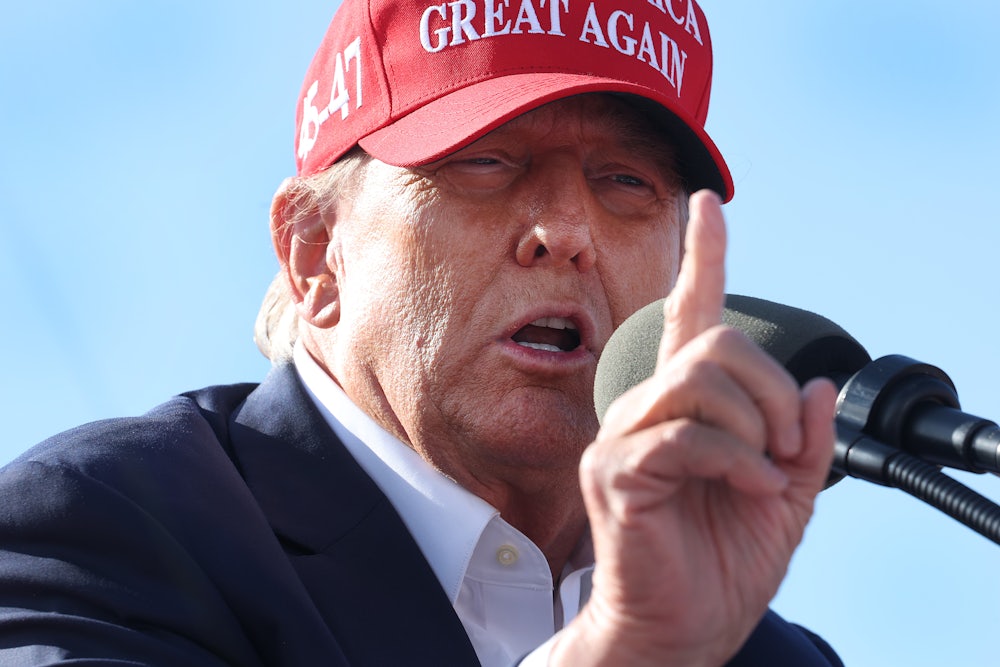For too long, Donald Trump has enjoyed the presumption among media and political elites that he’s fundamentally different from the Republican Party on the economy. This partly reflects what I’ve called “2016 brain,” which treats that year as the only important touchstone for interpreting our politics, to the near-total exclusion of everything that has happened since.
In 2016 Trump did differentiate himself by vowing to preserve the safety net, particularly for the elderly. Yet even though he largely outsourced his agenda as president to then-Speaker Paul Ryan and the plutocrats, who threatened all kinds of deep cuts to social programs, pundits still sometimes view him through that misleading 2016 prism.
That’s why Trump’s latest rant over Social Security and Medicare—in which he vowed never to touch those programs and absurdly blamed immigrants for threatening them—is such a key tell. Having succeeded at pulling off a massive deception on these topics once before, he fully knows both how fragile that illusion is and why shattering it is so dangerous to his 2024 hopes.
Trump posted this Thursday night on Truth Social:
Unlike the Democrats, who are KILLING SOCIAL SECURITY AND MEDICARE by allowing the INVASION OF THE MIGRANTS, I will NOT, under any circumstance, allow either of these two precious GEMS to be even touched under a Trump Administration. Biden is killing them both with the INVASION, while at the same time destroying our Country!
Plainly, what triggered this rage-rant was the news that a group of House Republicans has proposed a budget that would raise the retirement age for Social Security and restructure Medicare along lines that Paul Ryan–esque Republicans have long sought. Democrats have seized on this to bludgeon the GOP for threatening to cut the program.
Trump and his advisers know how big a problem this is for them. After Trump recently opened the door to Social Security and Medicare cuts, his campaign rushed to clean up his remarks. His eruption Thursday was clearly an effort to stanch the bleeding, now that House Republicans have opened that wound once again.
But here’s the thing: There is no particular reason to listen to what Trump says he’ll do on Social Security and Medicare. What really matters is that a large bloc of his party remains committed to the underlying principles of Paul Ryan–style economics and that when Trump is sitting in the Oval Office, he tends to hand control over to them.
The fundamental difference here between the parties is that Biden and Democrats think we should raise taxes on the rich and corporations, fortify Social Security and Medicare without serious cuts to benefits, and expand the safety net and invest in other programs for reducing inequality. By contrast, Trump and Republicans oppose higher taxes on the wealthy and corporations, and want to cut entitlements and the safety net pretty much wherever they can.
It’s sometimes said that Trump doesn’t have deeply held convictions on these things, but there’s no reason to doubt that he fundamentally agrees with those Republicans. We’ve seen this play out right before our eyes. In a useful examination of Trump’s record, NBC News’s Sahil Kapur shows that in 2012, Trump aligned himself with the position of the GOP’s presidential nominee, Mitt Romney, and Ryan, his running mate. Trump realized by 2016 that promising to preserve entitlements would distinguish him from that losing message.
But as Kapur also shows, Trump did propose Social Security cuts as president. He also tried hard to repeal the Affordable Care Act, which would have thrown millions off health insurance. And Trump signed multitrillion-dollar tax cuts that constituted a huge giveaway to the rich and corporations while failing to deliver on their promise of job-creating investment—tax cuts that Biden wants to repeal.
This contrast poses a serious difficulty for Trump. Recent polling by the Progressive Change Campaign Committee and Data for Progress found that a message linking a promise to protect Social Security directly to a vow to tax billionaires is a potent one, particularly when contrasted with the GOP desire to cut both entitlements and taxes on the rich.
Notably, Biden used language just like this in his State of the Union address, attacking Republicans for wanting to “cut Social Security and give more tax breaks to the wealthy.” Trump would not be rage-ranting about his supposed commitment to protecting these programs if he didn’t think on some level that this contrast poses a real threat to him.
It’s also sometimes said that Trump is different from Republicans on economics in that he implemented extensive tariffs. But this is better understood as an expression of a kind of free-floating, inchoate nationalism that’s bereft of deeply held economic principles.
If you doubt me on this, I challenge you to look at Trump’s vow to impose 10 percent tariffs across the board and discern any real economic ideas behind it. Indeed, as Paul Krugman shows, the tariffs Trump imposed as president failed to meaningfully help workers, and Customs and Border Protection data shows that the tariffs have cost Americans $230 billion to date. This, and the utter refusal to learn from these failures, make it clear that for Trump, tariffs just aren’t about economics.
You can see this at play in Trump’s rant, which claims immigrants threaten the long-term solvency of Social Security and Medicare. That gets things exactly backward: As many analysts have shown, more immigration would go a long way toward shoring up those programs, because immigrants would swell the ranks of working-age Americans, paying the taxes needed to support our aging population. Ron Brownstein has demonstrated that, ironically enough, Trump’s base of older blue-collar whites would be among the biggest beneficiaries.
But that aside, the point is that for Trump, economic policy is perpetually reducible to irritable nationalist gestures. Trump knows he can’t win the argument if the contrast pits Democratic proposals to tax the rich and protect Social Security against GOP vows to do the opposite. So he sidelines the debate onto political turf where he thinks he has the advantage.
Yet here’s the inescapable bottom line: We already know what Trump would do on these matters, because we saw him govern this way during his first term. That’s something we all lived through, and believe it or not, it’s in our power to consult that experience for guidance right now. Even if it did take place after 2016.






